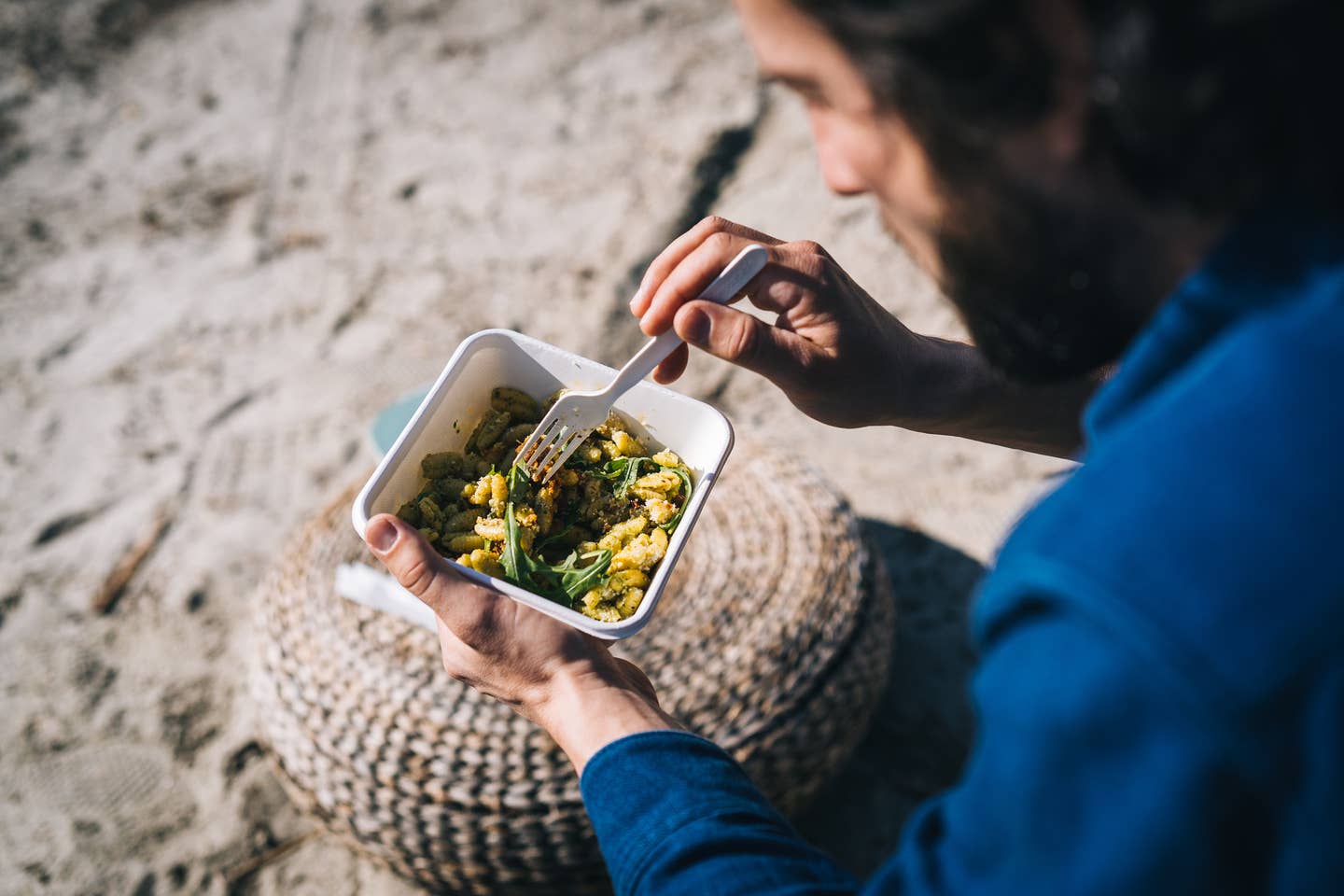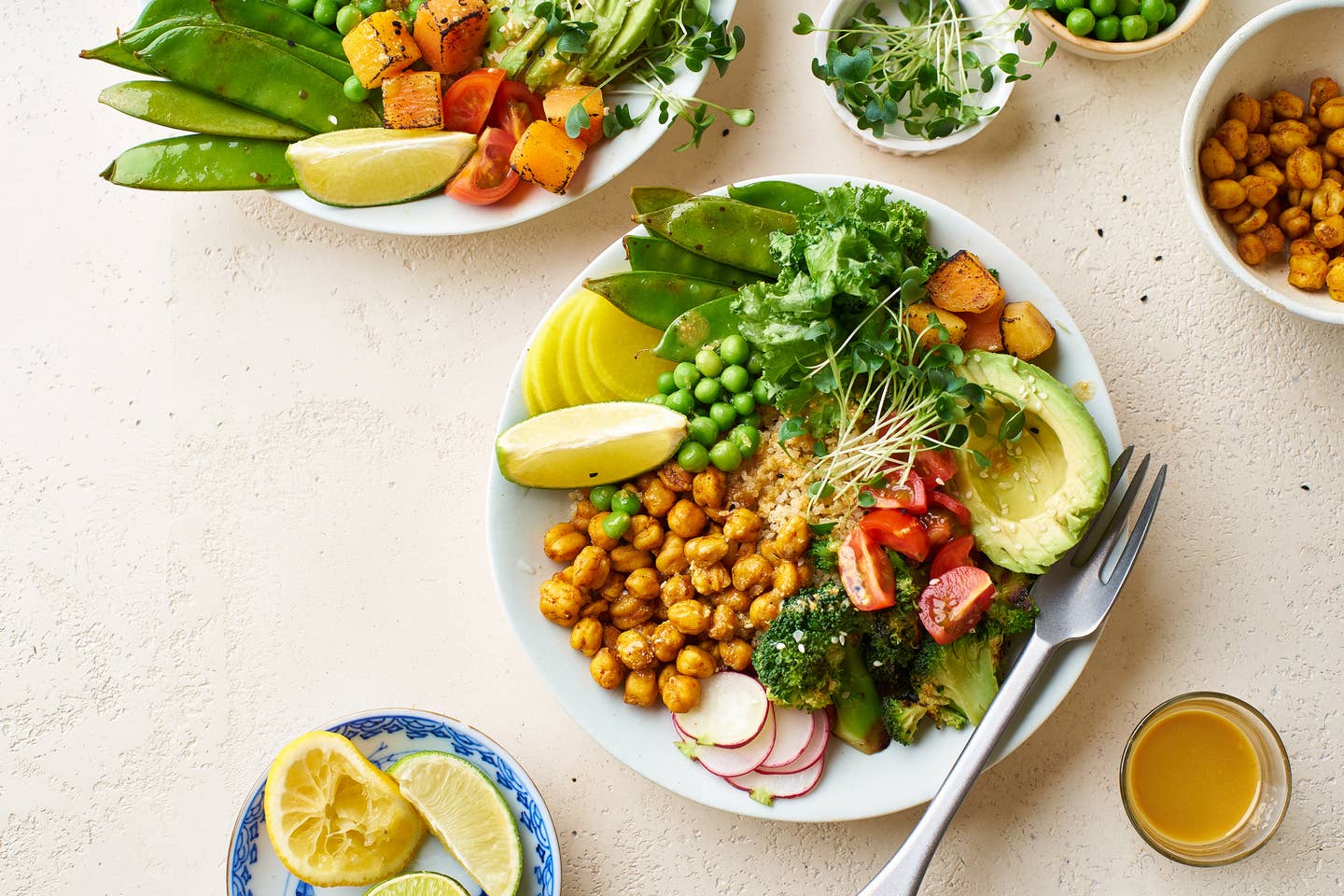
What I Eat In a Day as a Vegan Nutritionist and Athlete
Any long-time vegan knows the biggest misconception surrounding plant-based diets is the myth that you can’t get adequate nutrition (protein, especially) from plant foods alone. Many assume that vegans eat only smoothies and lettuce. This simply isn’t true, as vegan athletes and authors Robert Cheeke and Matt Frazier attest in their latest book The Plant Based Athlete, published last summer. The Game Changers documentary has worked brilliantly in bringing this information to light, by spotlighting plant-based athletes at the top of their sports.
You don’t need to dig deep into the scientific literature to find the evidence of it. A study published in the journal Nutrients, and this one by the Gatorade Sports Science Institute, shows how a 100 percent plant-based diet is as suitable for building muscle and fueling athletic endeavors as omnivorous diets. In fact, whole-food plant-based (WFPB) diets may have a slight edge as they’ve been shown to be better than omnivorous diets at improving recovery, reducing inflammation, and lowering your risk of developing chronic disease.
Even I had concerns when I adopted a WFPB diet five years ago. Would I actually be able to fuel my long endurance runs? Would I continue to build muscle? Or worse - lose the muscle I had worked so hard to achieve? I vowed that at the first inkling of athletic inferiority I’d immediately quit veganism and go right back to eating meat.
Five years later I’m in the best shape of my life and have more energy than ever. My hybrid training program - a combination of marathon endurance running with hypertrophy weightlifting - is fueled entirely by plants (most of which are whole foods).
So what does a vegan nutritionist and athlete eat to fuel a high volume of activity? Here's an in-depth look at what I consume on a typical day, including supplements, to fuel my physically active lifestyle and (hopefully) provide you with some ideas and inspiration to eat healthier and move your body more.
Determining Your Caloric Requirements
For anyone serious about optimizing their training and performance, it’s important to have a basic understanding of your caloric requirements. Essentially, your body requires high-quality calories from healthy whole foods for energy. The more active you are, the more calories you burn and therefore the more calories you require to recover and fuel your next activity.
There are numerous caloric requirement calculators free to use online (this one at Plant Space is easy to use). First, you calculate your basal metabolic rate (BMR), which is the number of calories your body burns at rest in a 24 hour period. Think of it as how many calories you’d burn just sitting on the couch binging on Netflix for an entire day.
BMR is determined based on age, gender, height, and weight. You then figure out your activity level to get a rough estimate of the number of calories you’d burn each day. Include any exercise you do on top of that to determine the total amount of calories burned in a day. You can adjust your diet as necessary to maintain, gain or lose weight depending on your fitness goals. Try tracking your nutrition and food intake on an online platform like Cronometer for best results.
To use me as an example, for a 35-year-old male who’s 6 foot 5 inches and weighs 215 lbs, my BMR is 2,028 calories. Adding in moderate daily activity (playing with my kids, walking the dog, doing chores around the house, running errands) I require approximately 2,800 calories. Plus 1,200 to 1,500 calories burned during running and weightlifting each day, that’s roughly 4,000 to 4,300 calories required per day just to maintain weight.
Now that we have a basic understanding of how to determine caloric requirements, let’s dive into what I eat on a typical day to see how it’s possible to fuel a physically active lifestyle from plants alone.
A Typical Day of Eating and Training on a Plant-Based Diet
5 am: Hydration / Pre-Run Coffee
After waking up and brushing my teeth, the first thing I do each morning is down a large glass of water to rehydrate my thirsty body. Hydration is critical for many bodily functions, like delivering nutrients throughout the body. Instead of shuffling into the kitchen to grab a coffee as soon as you wake up, drink a tall glass of filtered water first.
Besides providing a caffeine jolt to help wake you up, coffee has a diuretic effect that will help you go to the bathroom. Any runner can attest to the critical importance of a healthy bowel movement prior to a morning run!
6 am: Cardio Workout - 45-60 Minute Run
- Warm-up: 50 push-ups, 50 air squats, 30 pull-ups
- Run for 45-60 minutes to burn 750-1,000 calories
- Cooldown: 50 push-ups, 50 air squats, 30 pull-ups
7 am: Meal 1: Post-Run Breakfast - Rolled Oats and Fruit Breakfast Bowl
- 1 cup rolled oats
- 1 cup unsweetened soy milk
- 1 banana
- 1 cup blueberries
- 1 medjool date
- 2 tbsp pumpkin seeds
- 2 tbsp hemp seeds (sometimes this is flaxseed, alternate days)
- 1 tbsp natural peanut butter
- Optional: 1-2 drops of liquid vanilla stevia for some added sugar and calorie-free sweetness.
Total calories and macronutrient ratios: 951 calories; 127g healthy carbs (53%); 35g brain and heart healthy fats (33%); 36g protein (14%); 20g fiber
Try to eat more fat and protein-rich foods in the morning to keep you satiated and provide balanced energy. A carb-heavy breakfast will result in blood sugar spikes and ultimately an energy crash. I still include healthy carbs, such as whole grains and fruits that contain fiber, to help me recover and fuel my weightlifting workout later in the morning.
Most of what I eat in a day serves a purpose. Ask yourself: is this meal or snack intended to help me recover from a workout, build muscle, curb blood sugar spikes, fuel a workout, or all the above? The intent of this post-run breakfast is to replenish electrolytes and calories expended during my morning run.
If you have the energy, try doing your morning cardio in a fasting state. Doing cardio while fasting aids in healthy weight loss boosts metabolism, strengthens the immune system, promotes longevity through cellular autophagy, and increases testosterone levels in males.
8:30 am: Morning Snack - Sliced apple, kiwi, almonds
- Apple: 1 whole, sliced
- Kiwi: 2 whole, sliced
- Almonds: 23 whole
Total calories and macronutrient ratios: 364 calories; 57g healthy carbs (57%); 15g brain and heart-healthy fats (35%); 8g protein (8%); 13g fiber
9 am: Pre-workout drink
- 2 cups water
- Kaizen pre-workout to boost energy and enhance focus during the workout.
- 2 to 3 tablespoons of beetroot crystals to enhance blood flow during workouts.
9:30 am: Resistance Workout - Hypertrophy Weightlifting - 75-90 Minutes
- Warm-up: Dynamic stretching with resistance bands - 5 minutes or light cardio on elliptical/stationary bike - 5 minutes
- Typical weightlifting session for 60-75 minutes to burn 350-450 calories
- Cooldown: Light static stretching, one-minute hangs
11am: Meal 2: Post-Workout - Protein Smoothie Bowl
- 1 cup unsweetened almond milk
- 1 cup frozen mango
- 1 cup frozen kale
(This doesn’t have to be frozen, it’s just my personal preference. Use any green leafy vegetable you like. Spinach, cilantro, and parsley are other great options.) - 1/2 cup frozen green peas
- 1/2 cup frozen cauliflower (or cauliflower rice)
- 1 banana
- 1 Medjool date
- 2 tbsp flax seeds
- 1/2” chunk turmeric (or 1/2 tsp of ground turmeric)
- Dash of ground black pepper
- 1 scoop of plant protein powder
(I’m currently using Iron Vegan Athlete’s Blend as it’s vegan and heavy metal tested. Be sure to cycle your protein powders every 6 to 8 weeks for variety in amino acid profiles.) - Creatine: 5g
- Toppings: 1 cup mixed berries (blueberries, strawberries, blackberries), 1/4 cup organic dark raisins, 2 tbsp walnuts
Total calories and macronutrient ratios: 934 calories; 124g healthy carbs (50%); 30g brain and heart healthy fats (28%); 50g protein (22%); 31g fiber
I look forward to this smoothie bowl every single day. It’s become such a staple in my diet that I bring a mini-blender wherever I travel to ensure I can still make a protein smoothie bowl after workouts.
This meal is loaded with healthy carbs to help refuel and replenish glucose lost during exercise. It contains 30 grams of brain and heart-healthy fats, 31 grams of fiber, and a staggering 50 grams of plant protein.
The purpose of this meal is to quickly deliver nutrients to the muscle cells that are now starved for glucose (carbohydrates) after a workout. Make sure you’re getting at least 25 to 30 grams of clean plant protein in this meal. Specifically, 2 to 3 grams of the branched-chain amino acid leucine optimizes muscle protein synthesis.
You should still aim to get the majority of your protein from whole foods. Protein powder will help you get a little extra to meet your body’s demands without having to eat a ton of extra food.
Creatine is a widely recommended supplement for athletes. It’s tasteless, mixes well in a smoothie or glass of water, and 3 to 5 grams a day is all that’s required. Creatine is one of the most well-researched supplements. It hasn’t been shown to have negative health outcomes or side effects. It aids in muscle growth, recovery, and building strength.
Pro Tip: Combine the compounds curcumin and piperine. Both are highly anti-inflammatory and have potent antioxidative properties. Curcumin is found in turmeric and piperine in black pepper.
It was revolutionary for my training when I began adding turmeric and black pepper to my daily post-workout smoothie. All you need is a 1/4″ chunk of turmeric root (or 1/4 tsp of powder) with a dash of black pepper. The result? No inflammation, no soreness, and the ability to work out with intensity the next day.
1PM: Lunch - Avocado, Miso and Tempeh Sandwich with a side salad
Total calories and macronutrient ratios: 797 calories; 97g healthy carbs (49%); 27g brain and heart-healthy fats (30%); 42g protein (21%); 31g fiber
3PM: Afternoon Snack - Sweet potato and asparagus
- Sweet potato: 100g whole, baked or boiled for ~20 minutes until soft
- Asparagus: 6 spears, baked 15 mins.
- Salt and pepper to taste
Total calories and macronutrient ratios: 111 calories; 25g healthy carbs (90%); 0g brain and heart-healthy fats (0%); 4g protein (10%); 5g fiber
5PM: Meal 4 - Dinner - Crispy Tofu Caesar Salad
Total calories and macronutrient ratios: 856 calories; 95g healthy carbs (41%); 36g brain and heart healthy fats (36%); 55g protein (23%); 24g fiber
Total daily calories and macronutrient ratios: 4000 calories, 543g carbs (52%), 132g fats (28%), 196g protein (20%), 120g fiber
Who said you can’t get enough protein on a vegan diet?
Being a Vegan Athlete is Easier Than You Think
I hope this article shows how it’s possible - and enjoyable - to fuel your athletic pursuits with a 100 percent WFPB diet. These meals and snacks are highly nutritious, simple to make, and easy on the wallet.
All it takes is some time in the kitchen, tracking your nutrition, and consistency. Consistency compounds over time. Soon, you’ll be able to eat intuitively and you’ll know what your body needs to fuel, repair, and recover for that next workout.
For more plant-based fitness content, visit The Beet's Vegan Athletes articles.
More From The Beet







